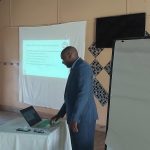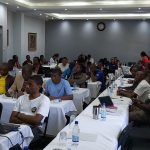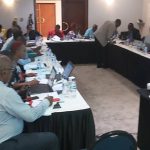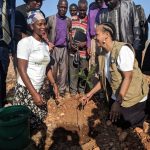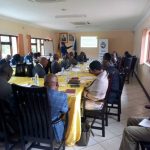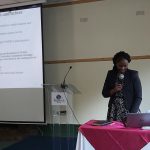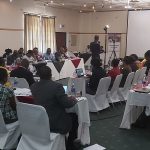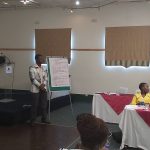The advent of Covid-19 is undoubtedly a threat to international peace and security as world economies are impacted negatively resulting in ripple effects across the globe. The pandemic has added misery to a world already reeling under the burden of climate change. As a member of the global family, Zimbabwe is not spared from these negative effects of this pandemic. The National Peace and Reconciliation Commission commends the rapid response by the Government of Zimbabwe through the measures already announced...
0 Comments
|
Thursday, March 19, 2020
National Peace and Reconciliation Commission (NPRC) Commissioner Charles Masunungure giving objectives of the Consensus Building workshop between NPRC and Provincial heads of Government departments in Mashonaland Central Province. Commissioner Masunungure pointed out that the purpose of NPRC's Complaints Handling and Investigations Department is to establish the truth in order to facilitate healing and reconciliation to those affected by conflicts. He also indicated that the Commission will request for assistance from ZRP to conduct investigations. At the same workshop NPRC Commissioner Choice Ndoro presented the National Peace and...
0 Comments
|
Monday, March 16, 2020
National Peace and Reconciliation Commission (NPRC) conducted a one and half day training workshop in Harare from the 13th – 14th March 2020 for enumerators for conflict mapping baseline survey in Harare, Manicaland, Mashonaland West, Mashonaland Central and Mashonaland East. NPRC’s Research and Knowledge Management thematic area facilitated the training. The enumerators’ workshop looked at the various conflict epochs in Zimbabwe dating back to the 11th Century to the current post independent period. The workshop aimed at equipping the enumerators...
0 Comments
|
Thursday, February 27, 2020
The Mashonaland East Peace Committee has summarised the major conflicts affecting the Province: a) Land disputes (residential and farming land including boundary disputes) b) Political conflicts c) Partisan distribution of inputs especially along political lines d) Wanton extraction of natural resources with no social investments e) Domestic violence and girl child abuse f) Leadership conflicts in churches We are committed to transitioning Zimbabwe from a conflictual past to a sustainable, harminious and peaceful society through generations!
0 Comments
|
Friday, November 22, 2019
Commissoner Chiradza and General Managers Mrs Mawema and Mr Mashingaidze met with community based organizations and their members in Mukwada Village. The CBOs have been lobbying the government and mining companies to prioritize infrastructure development (roads, schools, clinics, water, housing etc), employment of locals, respect for environmental rights as well for a quota of mining claims so that the Marange community also benefits from its local resources. NPRC urged the community to explore collaborative rather than combative engagement and to...
0 Comments
|
Wednesday, November 20, 2019
NPRC engages the National and Provincial Police Commanders on a Consensus Building/Capacity Enhancement Workshop. The NPRC explains it's mandate which is enshrined in section 252 of the constitution. The mandate of the NPRC explains what it was created to do. The broad functions of the NPRC are therefore the following: a) To ensure post conflict justice,healing and reconciliation. b)To develop and implement programmes to promote national healing,unity and cohesion in Zimbabwe and peaceful resolution of disputes. c) to bring about...
0 Comments
|
Wednesday, November 13, 2019
The major recommendation for NPRC suggested by Dr Prisca Kamungi is the need to manage expectations by: a) Establishing the kind of CEWER mechanism that is to be set up; b) Establishing the legal framework to set up an early warning system; c) Defining the terms of reference of the CEWER structure d) Defining institutional arrangements beyond NPRC's mandate including buy in and linkages with the response organs and political establishment e) Deal with contentious issues so that no further...
0 Comments
|
Tuesday, November 12, 2019
NPRC has initiated the process of capacitating its Commissioners and staff on Conflict Early Warning and Early Response (CEWER) in preparation for the setting up of a national CEWER system. This will help the Commission to detect conflicts before they escalate into violence. The training has been made possible through the support of American Friends Service Committe. Also supporting the process are representatives from the country's security architecture, members of the Commission's thematic committees, civic society organizations, political parties represented...
0 Comments
|
Tuesday, November 12, 2019
Indigeneous knowledge systems are central in the decision of early warning. Local people can interpret things in the environment and warn of impending conflicts. There is a gendered lens to conflict early warning systems and preparedness. If a woman detects certain conflict signs, it may mean something different to them as it would be to men
0 Comments
|
Tuesday, October 15, 2019
Under its constitutional mandate the NPRC and in recognition that the country has historically been characterized by episodes of conflict during elections – constraining prospects for credible and legitimate transitions; as well compromising the legitimacy of the elected government, the 2018 integrated election strategy acts as an instrument that helps the following: NPRC as one of the Chapter 12 institutions acts within it mandate in the elections and clearly articulates its objectives; and Clearly articulate the NPRC role in electoral...
0 Comments
|


